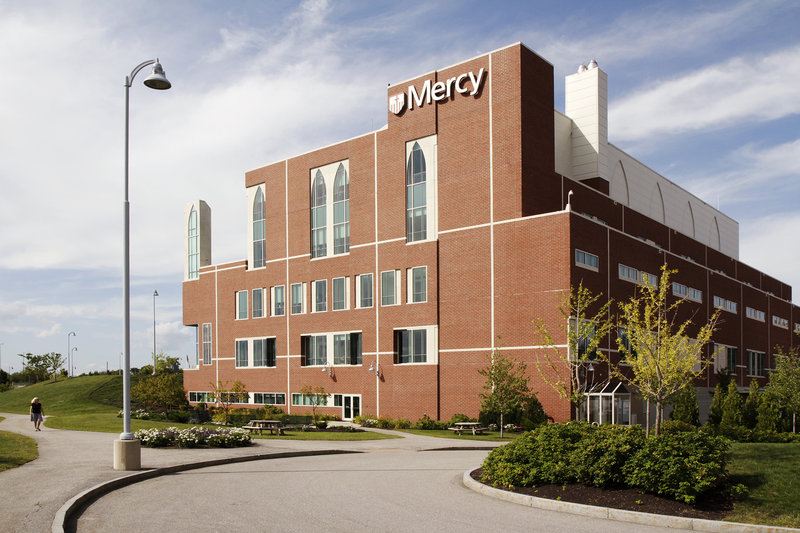Six to nine months from now, Mercy Health System of Maine in Portland plans to become part of Eastern Maine Healthcare Systems in Brewer, under an affiliation agreement signed Monday.
A full merger could take more than two years and likely lead to some consolidation of Mercy’s four campuses, but there’s no plan to reduce the overall number of jobs in the Catholic organization, said the systems’ presidents.
In the coming months, administrators from the two systems will seek approvals for the merger, including a state certificate of need, federal antitrust clearance and the Vatican’s blessing.
The merger’s potential impact on health care statewide remains unclear, especially in southern Maine, where Mercy competes directly with Maine Medical Center in Portland, the state’s largest hospital.
Eastern Maine Healthcare Systems is moving ahead with the merger despite Mercy’s recent financial troubles, largely because both systems plan organizational changes that will enable them to deliver health care in better, more affordable ways.
“We found an organization that shares our vision,” said Michelle Hood, president and CEO of Eastern Maine Healthcare Systems. “Adding Mercy to our system helps us continue our innovative work providing the needed infrastructure and system processes to improve the health status of the people of Maine.”
Mercy and Eastern Maine Healthcare Systems signed a non-binding letter of intent to merge on Dec. 7 — the day Mercy announced that it had ended merger negotiations with the for-profit Steward Health Care Systems of Boston.
A Steward executive later claimed that his group “unilaterally withdrew” from talks with Mercy because the nonprofit organization had misrepresented the condition of its finances and operations — an allegation that Mercy officials denied.
Faced with a weak economy and health care reform, Mercy started a strategic review more than a year ago — after opening its $85 million Fore River Campus in 2008.
It has made several rounds of layoffs since then, coping with revenue shortfalls that grew from $1.3 million in 2008 to $5 million in 2009 to $16.6 million in 2010, according to federal tax-exemption forms.
Hood said she believes that Mercy, with 1,857 employees including 127 full-time physicians, will benefit from operational and clinical expertise offered by her organization. Eastern Maine Healthcare Systems has more than 8,000 employees, including 500 physicians, among its seven hospitals, nine nursing homes and other facilities.
The health care community’s reaction to the pending merger was mixed on Monday.
Maine Medical Center issued a written statement saying that its executives “remain puzzled and disappointed in the lack of response from Mercy Health System over the years to engage in a productive dialogue that would benefit our community.”
Maine Medical Center has tried repeatedly “to find a common, community vision to Mercy’s growing financial difficulties,” said Mark Harris, the larger hospital’s senior vice president of planning and marketing.
“We are interested in learning more as the details of the (merger) agreement become known,” Harris said.
Elizabeth Mitchell, CEO of the Maine Health Management Coalition, said it’s too soon to predict how the pending merger would affect health care across the state.
Mitchell said her advocacy organization will be “open” to Mercy’s affiliation with Eastern Maine Healthcare Systems if it makes health care more affordable in Maine without reducing quality, safety or access.
Under the affiliation agreement, Mercy would leave Catholic Health East, a faith-based group of 35 hospitals and other health care organizations. The Sisters of Mercy would regain primary oversight of Mercy’s operations through a local board and according to the Ethical and Religious Directives for Catholic Health Care Services.
“EMHS supports our mission and our identity as a Catholic health care system,” said Eileen Skinner, president and CEO of Mercy Health System of Maine.
Hood said Mercy’s ethical and religious directives, issued by the U.S. Conference of Catholic Bishops, won’t be an issue because they’re “not inconsistent with any good clinical practice.”
The directives govern Mercy’s approach to women’s reproductive health care, including contraception, abortion and infertility procedures, which the church opposes.
The merger will include VNA Home Health & Hospice, a service unit of Mercy. During the approval process, representatives of both organizations will work together to identify the best methods for integrating Mercy into Eastern Maine Healthcare Systems.
Staff Writer Kelley Bouchard can be contacted at 791-6328 or at:
kbouchard@pressherald.com
Send questions/comments to the editors.



Success. Please wait for the page to reload. If the page does not reload within 5 seconds, please refresh the page.
Enter your email and password to access comments.
Hi, to comment on stories you must . This profile is in addition to your subscription and website login.
Already have a commenting profile? .
Invalid username/password.
Please check your email to confirm and complete your registration.
Only subscribers are eligible to post comments. Please subscribe or login first for digital access. Here’s why.
Use the form below to reset your password. When you've submitted your account email, we will send an email with a reset code.